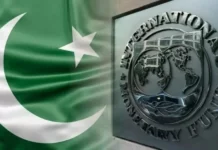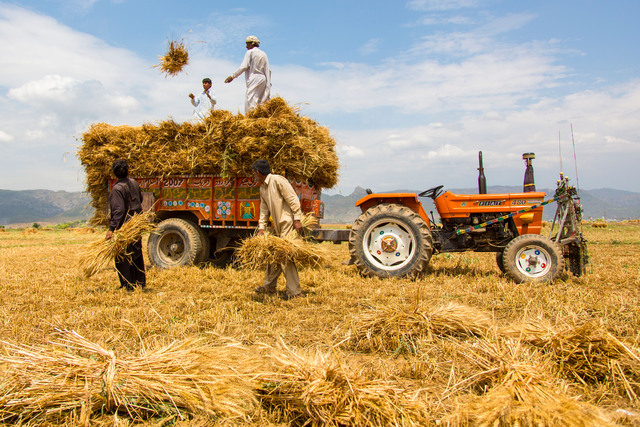ISLAMABAD: Pakistan’s agriculture sector is undergoing a severe crisis, with wheat farmers alone suffering an estimated loss of RS 2,200 billion since May 2024. This loss accounts for 23.15% of the crop sector’s contribution to GDP for FY2023–24, which stood at RS 9,500 billion.
According to Pakistan Kissan Ittehad, the wheat price for farmers has plummeted from the government support price of RS 3,900 per 40 kg to as low as RS 2,200 in 2025. At the same time, wheat production declined by 8.91%, from 31.81 million tons last year to 28.98 million tons in 2025, compounding the financial strain on the farming community.
Other major crops have also recorded significant production declines and market losses. Cotton production has dropped to 5.55 million bales, 34% below last year and 50% short of the national target. Farmers are incurring losses of RS 1,000 per 40 kg due to a price drop from RS 7,000 to RS 6,000. As a result, the cotton import bill is expected to soar to $1.9 billion, up from $448 million in the previous year. Spring maize production has also declined by 15.4%, from 9.74 million tons to 8.24 million tons, with prices falling from RS 2,850 to RS 2,050 per 40 kg. Sugarcane output has declined to 84.24 million tons from 87.64 million tons. Overall, the production of major crops has fallen by 13.49% in FY2024–25.
The agriculture sector’s growth has sharply declined from 6.25% last year to just 0.56% since July 2024. In parallel, Pakistan’s food trade balance has worsened. From July 2024 to April 2025, food exports declined slightly to $6.16 billion from $6.23 billion the previous year, while food imports surged to nearly $7 billion, compared to $6.82 billion in the same period last year.
The current tax structure has added to farmers’ difficulties. While imported cotton bales are exempt from GST, locally produced seed cotton is taxed at 18%, creating a stark disadvantage for domestic growers. This disparity, coupled with high input costs, has led to widespread frustration in the farming community.
Speaking at a press conference here at the National Press Club, Islamabad on Wednesday, Pakistan Kissan Ittehad President Khalid Mahmood Khokhar launched a scathing criticism of the government’s policies, claiming they are undermining agriculture and endangering national food security. He said farmers across all provinces are facing economic ruin due to high costs, a lack of subsidies, and unjust taxation. “Cotton imported from Brazil and the U.S. enters tax-free, but our own farmers are forced to pay 18% tax. This is economic injustice,” he stated.
Khokhar revealed that cotton growers have suffered more than RS 2,000 billion in losses by May 2025 and are now struggling to afford inputs for the next planting season. He lamented the lack of regional parity in support measures, pointing out that Indian farmers receive 10 hours of free electricity daily. “In Pakistan, agriculture is neither profitable nor respected. The small farmer is being pushed to the edge,” he said.
He also criticized the government’s claim of having made bread cheaper, arguing that while wheat prices have fallen, and there has been no actual relief for the public or for farmers. He emphasized that farmers have not benefitted from any meaningful state intervention.
Khokhar warned that further taxation on agriculture especially under IMF directives could devastate the sector. He called for the immediate abolition of GST and FED on agricultural inputs, including the 18% GST on seed cotton and the 14–18% GST on tractors and implements. He urged the government to introduce fair and transparent commodity pricing that ensures at least a 25% return on investment for farmers and to rationalize electricity tariffs to a flat rate of Rs 10 per unit.
Highlighting the worsening water crisis, he noted that groundwater levels have drastically dropped in many areas from 24 feet to over 70 feet further threatening the viability of farming.
Khokhar also made a direct appeal to the Chief of Army Staff to intervene, stating that agriculture is close to the Army Chief’s heart and that immediate action is needed to avert a national food emergency. He rejected the government’s announced relief packages as hollow and insufficient, calling for real, effective measures to rescue Pakistan’s agricultural economy from total collapse.
In reply to a query, he said that wheat inquiry finings have suspiciously been kept secret. He said three irrelevant officials have so been kept suspended to deceive the public and protect those actually responsible for creating the wheat crisis.
However, according to insiders, the inquiry report recommends dismissal from service for Mr. Imtiaz Ali Gopang, former Food Commissioner (Wheat); removal from service for the Director General; censure for Sohail Shahzad, Director Technical DPP (who was an OSD during the wheat import season); and exoneration for Dr. Waseem ul Hassan, former Head of the Oilseed Board. In addition, the report recommends withholding promotion for three years for Capt. (Retd.) Muhammad Asif, former Secretary, MoNFS&R. The inquiry report identifies Capt. (Retd.) Muhammad Mehmood as the principal character in the excessive wheat import scam from the outset, for permitting imports without placing a cap on quantity or time, according to sources privy to the Establishment Division.
























Agriculture is not close to the Army Chief but agriculture land is definitely close to his heart.
Agriculture is responsibility of Agriculture and Food Minister. Truth is land holders and those who do agriculture are treated like second grade Citizens because they are independent of Government. They grow their own food, they have their own lands, and they can look eye to eye with the bureaucrats unlike people living in Urban centers.